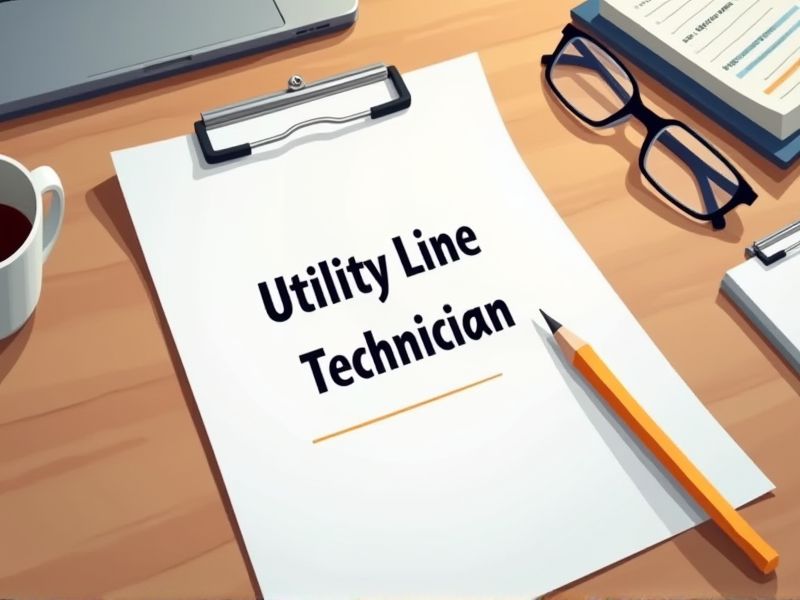
Utility Line Technicians maintain and repair electrical infrastructure, which involves high-risk activities. Certifications ensure that technicians possess the necessary skills and knowledge to safely handle equipment and complex systems. Regulatory bodies mandate certifications to uphold industry standards and safety protocols. Here are some important certifications required for Utility Line Technicians.
NJATC Lineworker Certification
The NJATC Lineworker Certification ensures that Utility Line Technicians possess the necessary skills for safe and efficient electrical system work. This certification is structured to reduce workplace accidents by providing comprehensive safety training. Holding the NJATC certification often influences career advancement opportunities and enhances employability in competitive utility sectors. Companies prioritize hiring certified technicians to maintain compliance with industry standards and ensure reliable power distribution.
OSHA 10-Hour Construction Safety Certification
Utility line technicians face hazardous working conditions, including exposure to electrical currents and working at heights. The OSHA 10-Hour Construction Safety Certification provides essential safety training that helps reduce the risk of accidents in such environments. Knowledge gained through this certification empowers technicians to identify and mitigate potential workplace dangers. Employers often require OSHA certifications to ensure compliance with safety regulations and to promote a safer workplace culture.
OSHA 30-Hour Construction Safety Certification
The OSHA 30-Hour Construction Safety Certification provides comprehensive safety training crucial for utility line technicians working in high-risk environments. This certification significantly reduces the likelihood of workplace injuries by educating technicians about necessary safety protocols. It ensures compliance with federal safety regulations, thereby minimizing potential legal and financial liabilities for employers. Enhanced safety awareness from this training leads to more efficient work processes, increasing overall productivity on construction sites.
NFPA 70E Electrical Safety Certification
Utility Line Technicians face significant risks of electrical hazards, and NFPA 70E Electrical Safety Certification provides standardized guidelines to mitigate these dangers. By obtaining the certification, technicians gain essential knowledge on safe work practices and personal protective equipment. Employers risk legal and financial consequences without certified personnel, as safety compliance is mandatory. NFPA 70E certification enhances a technician's credibility and career opportunities in the electrical industry.
CPR and First Aid Certification
CPR and First Aid Certification equips utility line technicians to respond to emergencies, minimizing potential injury severity in remote work environments. Line technicians often work in isolated areas where immediate medical help is unavailable; thus, certification enables them to manage life-threatening situations effectively. The certification provides critical skills that can enhance workplace safety protocols and foster a culture of preparedness. By possessing CPR and First Aid knowledge, technicians contribute to a safer work environment, potentially reducing accident-related downtime.
Aerial Lift Operator Certification
Aerial Lift Operator Certification is crucial for utility line technicians because it ensures they possess the necessary skills to safely operate equipment at heights, significantly reducing accident risks. Certification training often covers essential safety protocols and emergency procedures, which can prevent serious injuries and fatalities. Employers require certification to comply with Occupational Safety and Health Administration (OSHA) regulations, mitigating potential legal liabilities. Certified technicians generally improve operational efficiency by adhering to standardized safety practices, minimizing disruptions in utility services.
Confined Space Entry Certification
Confined Space Entry Certification is needed for a Utility Line Technician because it ensures they understand the potential hazards in confined spaces, such as toxic fumes or inadequate ventilation. This certification provides the technician with essential safety protocols and emergency procedures, reducing the risk of accidents. Proper training allows technicians to assess and mitigate risks, maintaining a safer working environment. Regulatory compliance is also achieved as many regions mandate certification for jobs involving confined spaces, promoting overall workplace safety standards.
Rigging and Hoisting Certification
Rigging and hoisting certification ensures utility line technicians possess the necessary skills to safely operate equipment and handle heavy loads, reducing the risk of workplace accidents. Proper certification equips technicians with the knowledge to comply with industry regulations and standards, which aids in maintaining operational efficiency. Employers often require this certification to minimize liability and ensure that their workforce meets professional standards. Training increases overall job performance by fostering confidence and competence in complex utility operations.
High Voltage Safety Certification
High voltage safety certification equips utility line technicians with the knowledge to handle electrical systems safely, reducing the risk of accidents and injuries. Proper certification ensures compliance with occupational safety regulations, which can help prevent costly legal issues for utility companies. Certified technicians are better prepared to respond to emergencies, minimizing downtime and service disruptions. Higher safety standards contribute to extending the lifespan of electrical infrastructure by preventing damage caused by improper handling.
Tree Climbing and Aerial Rescue Certification
Tree Climbing and Aerial Rescue Certification equips utility line technicians with critical skills for safely navigating and working at heights, which decreases the likelihood of injury while maintaining electrical infrastructure. Certification ensures technicians are trained to quickly and efficiently rescue colleagues in emergency scenarios, minimizing downtime and potentially reducing fatality risks. Demonstrating proficiency in these areas can lead to increased job opportunities and compliance with occupational safety standards. By validating the technician's abilities, utility companies lower the risk of liability and enhance public trust in their commitment to safety.
Summary
By acquiring certifications, you enhance your skills and expertise as a Utility Line Technician. This leads to increased job security, as employers often recognize certified professionals as more competent and reliable. Certification can also open up opportunities for career advancement, potentially resulting in higher wages. Employers benefit from your improved knowledge, which contributes to maintaining efficient and safe utility operations.
